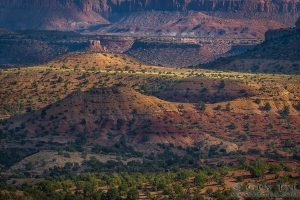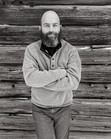Dimensions of Experience
Only by going alone in silence, without baggage, can one truly get into the heart of the wilderness. All other travel is mere dust and hotels and baggage and chatter. ~John Muir
I made fresh tracks for the last ten miles or so of a recently flooded two-track road in a largely anonymous part of the desert on my way to a favorite campsite overlooking colorful claylands—deposits of bygone days of great rivers and shallow seas. Today, a quarter billion years later (give or take), summers bring both hot dry days and spectacular thunderstorms to this high desert, which deter even the few who visit here in other seasons. Dodging deep ruts and flood debris, I arrived at the edge of a mesa and set up my camp while Millie the dog panted patiently in the shade of a nearby tree. When finished, I retrieved a refreshing beer from the ice chest and sat below an old pinyon pine to admire the view and the silence. Scattered around me were rock flakes indicating the former presence of Neolithic people, likely members of Puebloan or Fremont cultures, perhaps even older. People visited and lived in these parts for well over ten thousand years, yet their traces are mostly absent or negligible.
There are things you feel when alone in wilderness that challenge you emotionally and intellectually in ways not possible in the company of others, or in other settings. This is because, in the company of your own thoughts, without the distractions of the human-made worlds and the so-called human condition, even your conscious mind is powerless to avoid looking inward. In moments of reckoning, you are being interrogated and held to account by your most formidable critic—one you can’t hide anything from and whose judgment you cannot easily dismiss for such reasons as lack of trust or for failing to understand you. But this is also the reason this critic’s voice is one you should heed more than any other.
I wonder sometimes if people’s innate obsession with the opinions and antics of other people, which greatly attenuates, sometimes silences, one’s inner voice in favor of the tyranny of social conformity and expectations, is the reason for so many mythical tales of great souls wandering into the wild to seek revelations. Perhaps the fact that one’s inner voice is so easily distracted from when in the presence of others may also be the reason for attributing such revelations to supernatural origins rather than to one’s own mind struggling to assert rational thinking over the cacophony of the hive. Evolution made us social animals, and in the process also provided means for the collective to overwhelm one’s capacity for, and perceived value of, private inner experience.
It is a commonplace of all religious thought, even the most primitive, that the man seeking visions and insight must go apart from his fellows and live for a time in the wilderness. If he is of the proper sort, he will return with a message. It may not be a message from the god he set out to seek, but even if he has failed in that particular, he will have had a vision or seen a marvel, and these are always worth listening to and thinking about. ~Loren Eiseley
Photographers, I hate to admit, contributed a great deal to the perception that the experience of the wild can be reduced to appearances—to feats of geography and weather, to qualities of light, to visually interesting arrangements, to juxtapositions of colors and patterns and textures and lines and shapes. But such a perception is tragically lacking. Not only does it fail to convey other dimensions of the wild experience, but it fails in a greater sense to inform viewers who have not had such experiences that these dimensions even exist, let alone that they may possess greater powers to transform a life than any image or number of images can. But photography is not alone in such failures. Even the so-called conservation movement, advocating the preservation of the wild, fails utterly to acknowledge, educate, and campaign for the experience of wildness in all its dimensions.
Silence, solitude, anonymity, difficulty of access, remoteness, physical disconnect from the trappings of humanity, the need to rely on one’s skills, knowledge, and faculties for survival and comfort—all these are indispensable dimensions of the wild experience. And as we continue to “develop” parks and monuments, or even so-called “wilderness areas”—making them more accessible, more popular, more business-friendly, more family-appropriate, less risky, less demanding of commitment and skill and time, less anonymous, less mysterious, less detached—we also profoundly change the experiences they offer. And the result: as a society, we favor more people having lesser experiences to preserving the actual experience of wildness.
A wild experience is not only about seeing the wild, it’s not even about being in the wild, it’s about being wild in the wild. When living wildly, the very perception of one’s existence in the world is different from that of playing whatever role in whatever community one belongs to. In the manufactured world, time and distance are simple dimensions, metered in simple and equal units. In the wild, detached from expectations, judgment, schedules, human obligations, and the need for common denominators, time and distance have dimensions of their own. Time is not just measured in hours or minutes or seconds, but also in depth. Time passes at different rates depending on experience, and in disregard of what the chronograph says. Distance is measured in effort, in heat or chill, in sensory perceptions encountered as one traverses or studies the land, rather than in meters or miles. One hour is not like another hour. One mile is not like another mile. There are many more qualifications to distinguish one hour from another and one mile from another. And these perceptions—their variety and the subjective meanings we assign to them—are the true measures of life, which are not reducible to, or quantifiable in, simplistic terms like “hour” or “mile” or “year” or “kilometer.”
I find it a useful exercise, when in the wild, to let go of words altogether—to think without words, to experience without words, to not bother myself with how I will later describe—in words—the experience to others. Because “others” and “later” are the perspectives of outsiders looking in, removed from the experience, and often lacking a frame of reference. For such descriptions, memory will suffice after the experience had passed.
Let go of words; banish them if you have to. Just be. Feel the pulse of life in and around you without assigning names and categories, and without consideration for whether, or how, you may wish to share your perceptions with others. Words are symbols. We symbolize things to simplify them and to communicate them effectively and efficiently. But our perceptions, if we are to allow them the complexity, nuance, and ambiguity needed in order to be the subjective interpretations we each feel in our own way, are never identical to those of others, and neither are the private inner states they inspire in the singular amalgam of thoughts, emotions, beliefs, and psyche that is each of us—things nobody else can feel in exactly the same way, and that therefore have no words to adequately symbolize them. Words are lesser representations of the holistic experience, to be used when communicating outwardly, when lower common denominators are needed. But they are poor substitutes for the multi-sensory experience felt in the raw, as it happens, without attempting to describe it.
Language is a detriment, an earthbound limitation from which the poet suffers more than anyone else. At times he can actually hate it, denounce it, and execrate it—or rather hate himself for being born to work with this miserable instrument. ~Hermann Hesse
If you are wondering what I mean by my use of the term “wild experience,” and have never found yourself immersed in deep, wordless, contemplation when alone in a remote and wild place, it is unlikely that you will be able to understand what I say here. Even if you read every account—fictional or factual—about being in the wild, you will still not understand it. Consider giving yourself what may be among the greatest gifts you ever receive, and try being wild in a wild place. Free yourself from preconceptions, from anything having to do with other people, from the news, from conversation, from communications, from obligations and judgment, from traditions and opinions—from anything artificial save for the things you need for your own survival, and see what you find. It will not be what I, or anyone else, found. It will be you, in the most literal sense there is. Make yourself aware of all dimensions of experience, including mystery and fear, beauty and excitement, intuition and knowledge. Find your wild, rather than limit yourself to seeking “the” wild.




